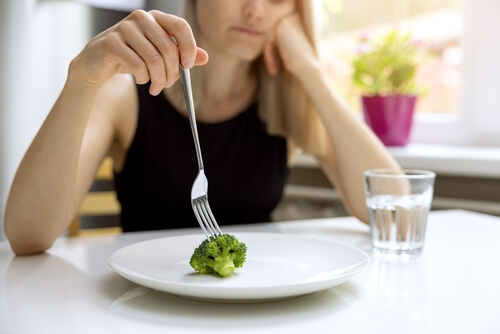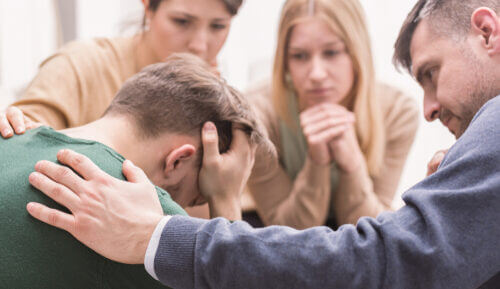
Page contents
- What are eating disorders?
- How serious is it?
- Who is affected by it?
- How do you know someone has an eating disorder?
- What are the different types of eating disorders?
- What causes eating disorders?
- How can you support someone with an eating disorder?
- Help for eating disorders
- Can you recover from an eating disorder?
Page contents
- What are eating disorders?
- How serious is it?
- Who is affected by it?
- How do you know someone has an eating disorder?
- What are the different types of eating disorders?
- What causes eating disorders?
- How can you support someone with an eating disorder?
- Help for eating disorders
- Can you recover from an eating disorder?
What are eating disorders?
This article looks at different types of eating disorders, eating disorder symptoms and warning signs and how to get help for eating disorders. This is a mental health illness, where food is used as a coping mechanism and unhealthy eating practices are adopted.
Using unhealthy eating practices is a way some people try to manage difficult situations or feelings.
The eating disorder charity BEAT estimates around 1.25 million people in the UK (1 in 50) have an eating disorder.
How serious is it?
When someone does not have an adequate diet, they may not get essential nutrients necessary for their health, development and ability to function. All eating disorders can be fatal, if left untreated.
Who is affected by it?
Eating disorders can affect anyone regardless of gender, age or race. Contrary to popular belief, it is not something that affects only women.
How do you know someone has an eating disorder?
Different types of eating disorders can be diagnosed, depending on the specific symptoms. It is possible for someone to move between diagnoses if their symptoms change.
What are the different types of eating disorders?
There are many different types of eating disorders.
Types of eating disorders include:
- Binge Eating Disorder (BED).
- Anorexia Nervosa.
- Bulimia Nervosa.
- Avoidant/Restrictive Food Intake Disorder (ARFID).
- Other Specified Feeding or Eating Disorder (OSFED).
What causes eating disorders?
Why do some people have eating disorders? The cause can vary.
A person may develop an eating disorder, for example, because:
- A family member has a history of eating disorders, depression, alcohol or drug misuse.
- You have been criticised for your eating habits, body shape or weight.
- You are extremely focused on being slim, particularly due to the type of job you have, or you have low self-esteem, an obsessive personality or are a perfectionist.
- You have experienced a trauma, stressful event or been sexually abused.
The way the person treats food may make them feel more able to cope or may make them feel in control.
Campaigner Hope Virgo says everyone should be sensitive to friends and family who may have eating disorders. The author of ‘You Are Free’, highlights that the cost-of-living crisis and the pressure to skip meals due to financial difficulties can trigger people who are trying to recover from eating disorders, as can the stress of hearing discussions about needing to restrict eating or the cost of food.
Eating Disorder Symptoms: What are the warning signs?
There are a number of symptoms that can act as warning signs for people to look out for.
What is Binge Eating Disorder (BED)?
People with Binge Eating Disorder (BED) eat large amounts of food in a short period of time (binge eating) until they feel too full. They do not tend to try to get rid of this food afterwards by, for example, vomiting.
They do not actually want to eat this much food but do not feel like they are in control of what they are doing.
People might binge eat because they are struggling to cope with strong feelings like extremely low, bored, angry, upset, anxious, happy or excited.
Warning signs and symptoms of Binge Eating Disorder
- Eating very fast.
- Eating until uncomfortably full.
- Eating large amounts of food when not hungry,
- Avoiding eating around others.
- Feeling disgust, shame or guilt after binging.
- Buying lots of food.
- Hoarding food.
- Social withdrawal.
- Irritability and /or mood swings.
- Spending a lot of time thinking about food.
- Feeling out of control around food.
- Feeling anxious and tense, especially when eating in front of others.
- Low confidence and self-esteem.
- Depression or anxiety.
- Insomnia.
- Weight gain.
- Bloating.
- Constipation.
- Stomach pains.
Treatment for BED
Treatment should look to reduce the frequency of binges and tackle thoughts related to bingeing.
NICE recommended treatment for binge eating disorder:
- Cognitive Behavioural Therapy (CBT). The talking therapy CBT, whether in group sessions or individual sessions, enables the person to talk about their feelings and can change the way someone thinks and behaves. It can help a person deal with overwhelming problems in a more positive way by breaking them down into smaller parts and looking at thoughts, physical feelings and actions. It is shown to change negative patterns to improve the way people feel.
- Psychoeducation, self-monitoring of the eating behaviour and helping the person analyse their problems and goals.
- Making a daily food intake plan and identifying binge eating triggers.
- Body exposure training and helping someone identify and change negative beliefs about their body.
- Support to avoid relapses and cope with risks and triggers.
“Let me start by saying I am a man and I have an eating disorder”, blogs one man who shares his story on the BEAT website.
“I have uncontrollably eaten large amounts of food before being faced with severe guilt and a wall of depression, or as I call it: “the big dark cloud”. I can’t even pinpoint when this all began – most likely around 10 – 12 years ago.
He describes bingeing sometimes a few times per week, others only a few times per month.
“I had never told anyone about this…I hadn’t even told my wife!
“It just slipped out one day while having a beer with my friend, this part of me that had been bottled up for so long, my relationship with food and how I binged… and it was the biggest weight off my shoulders I’ve ever experienced.”
Since then, he’s visited a dietician specialising in eating disorders.
“I still get bouts of feeling low and still suffer from poor body confidence. I always questioned “will I be taken seriously” or “perhaps I’m just a greedy person” or “everyone gets low and comfort eats”. If you’re feeling like this or if you know someone that sounds like this, then take it seriously. Tell someone and seek help from an expert.”
What is Anorexia Nervosa?
Anorexia nervosa involves a person trying to keep their weight as low as possible by not eating enough food and/or exercising excessively.
Warning signs and Anorexia Nervosa symptoms
- Skipping meals and eating little.
- Fear of gaining weight and being fat.
- Believing you are fat, when you are a healthy weight or underweight.
- Having an unusually low body mass index (BMI).
- Taking medicine to limit hunger (appetite suppressants).
- Taking medicine in order to defecate more (laxatives) or urinate more (diuretics).
- Feeling light-headed or dizzy.
- For girls periods not starting or for (non-menopausal) women periods stop.
Treatment for Anorexia Nervosa
NICE guidelines (‘Eating disorders: Recognition and Treatment’ December 2020) recommend a person with Anorexia Nervosa consider one of the following treatments:
- Maudsley Anorexia Nervosa Treatment for Adults (MANTRA) which aims to tackle the cognitive, emotional, relational and biological factors impacting a person with anorexia nervosa.
- Talking therapies including Cognitive Behavioural Therapy (CBT).
- Specialist Supportive Clinical Management (SSCM). This focuses on improving eating disorder symptoms and improving overall quality of life to help people meet their own treatment goals.
What is Bulimia Nervosa?
A person with bulimia nervosa will eat a large amount of food over a very short time (binge eating) and then getting rid of the food you have eaten (purging) by making yourself vomit, taking laxatives or diuretics, fasting or exercising excessively.

Warning signs and Bulimia Nervosa symptoms
- Eating a lot of food, very fast.
- Going to the bathroom a lot after eating.
- Excessively exercising.
- Highly critical of your weight and body shape.
- Not wanting to put on weight.
- Thinking a lot about food.
- Behaving secretively.
- Avoiding social situations where food may be present.
- Feeling guilty, ashamed.
- Changes in mood.
- Having no control over your eating.
Andrew Morton published a book called ‘Diana: Her True Story- in her own words’. At the time, it was one of the most famous, explosive examples of the condition.
“The bulimia started the week after we got engaged and would take nearly a decade to overcome,” Diana recorded herself saying about her engagement in 1981 to King Charles (who at the time had the title Prince of Wales).
“My husband put his hand on my waistline and said: ‘Oh, a bit chubby here, aren’t we?’ and that triggered off something in me—and the Camilla thing.”
Treatment for Bulimia Nervosa
NICE guidelines recommend:
- Cognitive Behavioural Therapy (CBT).
- Establishing a pattern of regular eating.
- Addressing the extreme dietary restraint, the concerns about body shape and weight, the tendency to binge eat in response to difficult thoughts and feelings.
- Focus on maintaining positive changes and minimising the risk of relapse.
What is Avoidant/Restrictive Food Intake Disorder (ARFID)?
An individual with Avoidant/Restrictive Food Intake Disorder (ARFID) either avoids certain foods, limits how much is eaten or both.
A person with ARFID might have negative feelings over the smell, taste or texture of certain foods, be responding to a bad experience with food, (for example, choking or being sick) may not feel hungry or just have a lack of interest in eating.
Warning signs and ARFID symptoms
A person with ARFID may have one or more of the following symptoms.
- Eating less food than is healthy.
- Skipping meals.
- Avoiding social situations where food may be involved.
- Not recognising when they are hungry.
- Feeling full after only a few mouthfuls.
- Taking a long time to eat, taking small bites or chewing very slowly.
- Finding eating hard work.
- Weight loss.
- Being sensitive about certain aspects of food e.g. smell, texture or temperature.
- Always eating the same meals.
- Anxiety at mealtimes.
Treatment for ARFID
Your GP should make a referral to the relevant treatment service or professional, for example Child and Adolescent Mental Health Services (CAMHS), specialist eating disorders services, mental health services, a dietitian, psychologist or an occupational therapist.
What is Other Specified Feeding or Eating Disorder (OSFED)?
A person may have an OSFED if their symptoms do not fit the symptoms for specific eating disorders.
For example,
- Night Eating Disorder. Repeatedly eating at night.
- Atypical anorexia nervosa e.g. weight remains normal despite other anorexia nervosa symptoms.
- Purging disorder e.g. being sick or using laxatives, to reduce weight or shape, however this is as part of binge/purge cycles.
Treatment for OSFED
For people with OSFED, NICE guidelines recommend ‘using the treatments for the eating disorder it most closely resembles’.
How can you support someone with an eating disorder?
Anyone who has an eating disorder needs compassionate support to help them get better. This can involve you encouraging them to seek help and helping them to take the first step by going with them to talk to their GP.
Help for eating disorders
- You should talk to your GP and they should refer you to an eating disorder specialist or team of specialists if they think you have an eating disorder.
- Cognitive Behavioural Therapy (CBT).
- When it comes to the Mental Health Act and compulsory treatment, NICE guidelines recommend that ‘if a person’s physical health is at serious risk due to their eating disorder, they do not consent to treatment, and they can only be treated safely in an inpatient setting’, follow the legal framework for compulsory treatment in the Mental Health Act 1983.
- You can talk to an adviser from eating disorders charity BEAT by calling its adult helpline on 0808 801 0677 or youth helpline on 0808 801 0711. The helplines across the UK are:
England: 0808 801 0677.
Scotland: 0808 801 0432.
Wales: 0808 801 0433.
Northern Ireland: 0808 801 0434.
Can you recover from an eating disorder?
Yes, you can recover from an eating disorder but it will take time and each person’s road to recovery is different.
The eating disorder charity BEAT states: “We know at Beat from our daily contact with people affected that it is very possible to make a full recovery. Like any other illness, the sooner someone with an eating disorder is treated, the more likely recovery is.”


